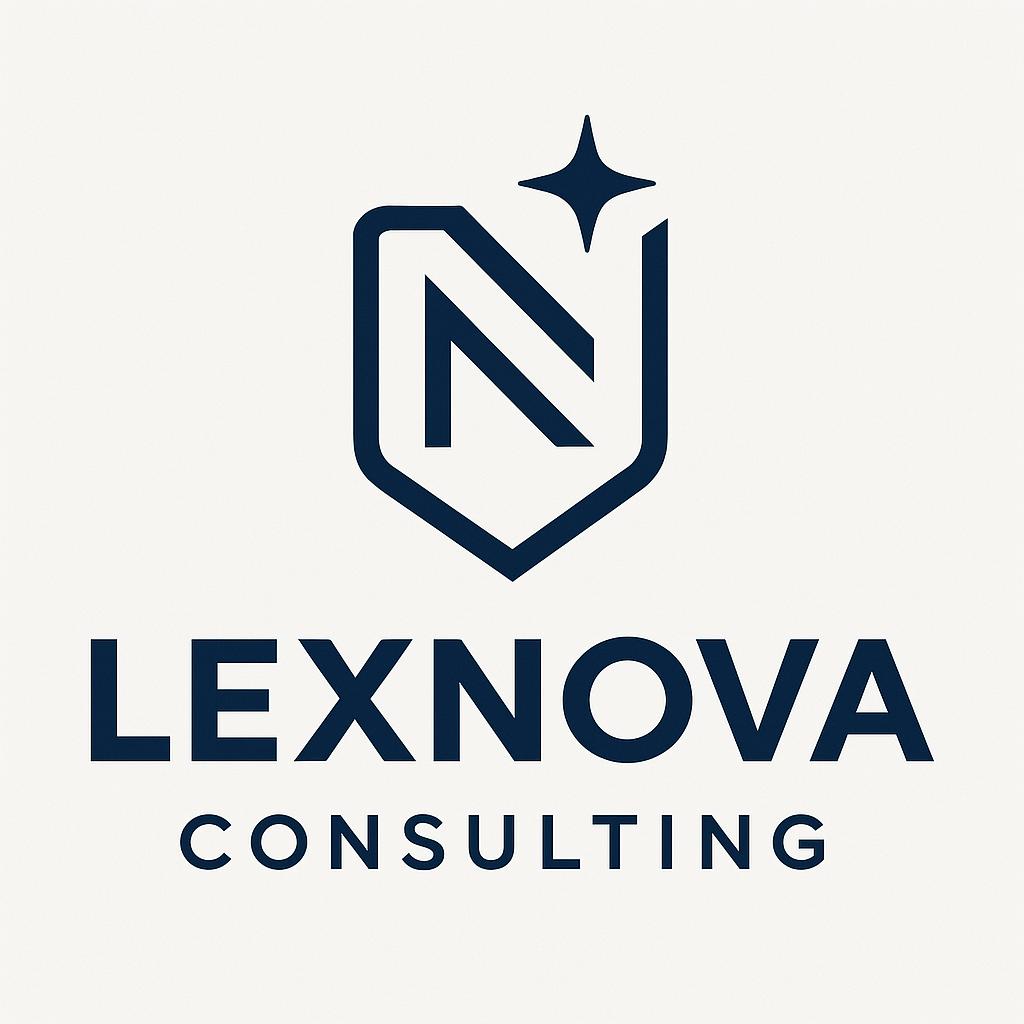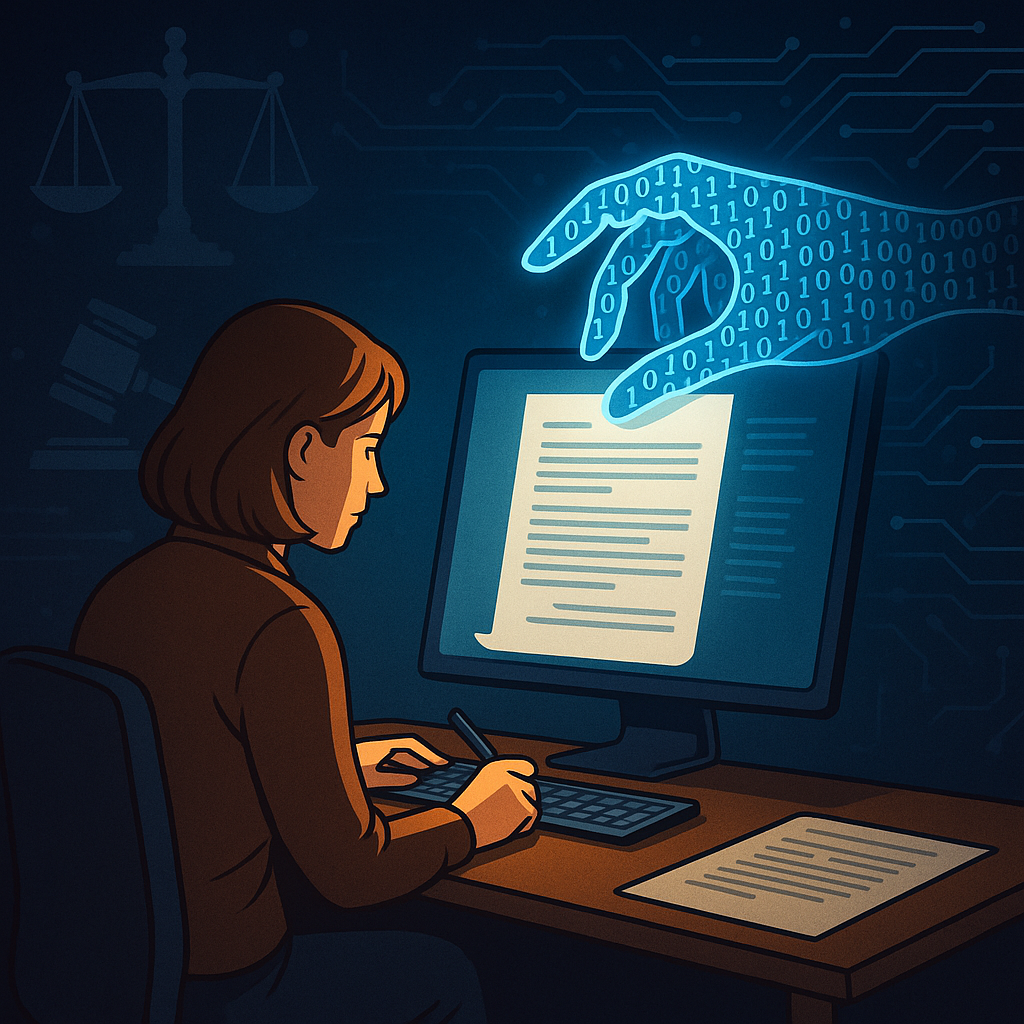Introduction: AI Copyright Battles Begin
The age of artificial intelligence has opened new frontiers, some exhilarating, others legally explosive. At the center of this evolving storm is AI copyright, a domain now being shaped in real time by courts, regulators, and creators.
In June 2025, a wave of litigation hit the tech world as authors sued Microsoft and OpenAI, alleging unauthorized use of their copyrighted works to train AI systems like ChatGPT. This AI copyright lawsuit has triggered intense global debate: Can companies use copyrighted data to train AI models without consent? Or are creators entitled to compensation, licensing, or even legal redress?
This blog breaks down the legal battlefield, comparing AI copyright laws across the US, UK, India, and Canada, exploring what the Microsoft case means for future AI development, and laying out how both companies and creatives should prepare.
The Microsoft & OpenAI Lawsuit: What’s at Stake?
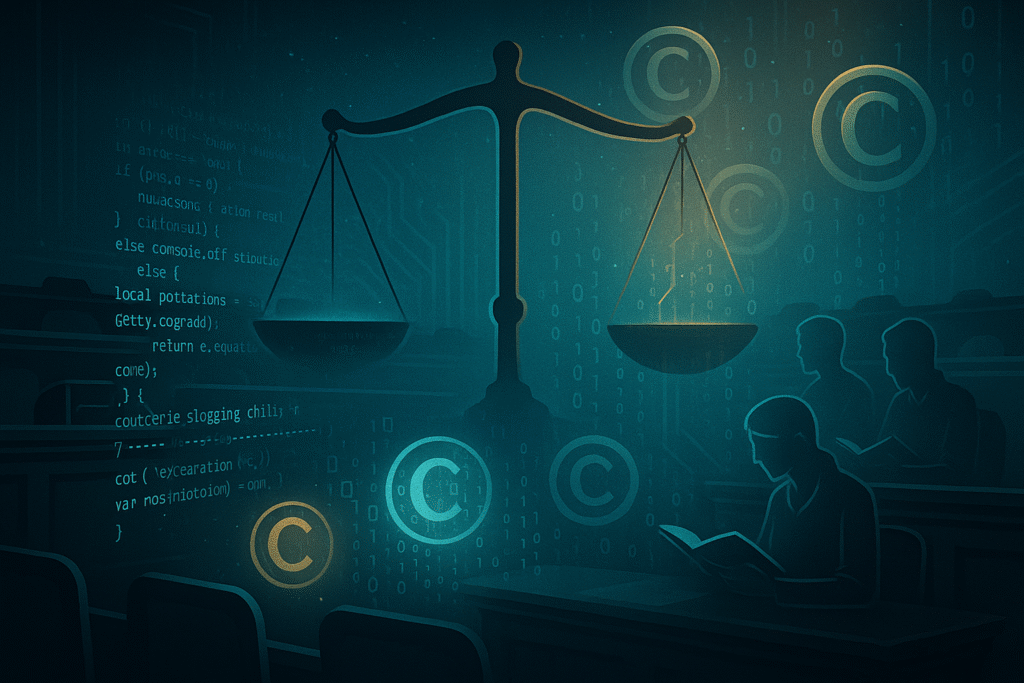
Filed in New York federal court, the lawsuit accuses Microsoft and OpenAI of infringing authors’ copyrights by training large language models on published books without permission or payment. The plaintiffs argue that this use was not “transformative”, violating Section 106 of the U.S. Copyright Act, which reserves reproduction rights for original authors.
Key Allegations:
- Text and data from copyrighted works were extracted without licenses.
- Outputs from ChatGPT contain recognizable passages or summaries of these works.
- The companies earned billions from products built on potentially infringing material.
The defense? Microsoft and OpenAI argue that their use qualifies as “fair use”, a doctrine long debated but never fully tested in the AI context.
🧷Full Complaint Document – U.S. Court Filing
AI Copyright in the US: Fair Use or Infringement?
In the U.S., fair use (17 U.S. Code § 107) allows limited use of copyrighted works for purposes like commentary, criticism, research, or education. Courts examine four factors:
| Factor | Explanation |
|---|---|
| Purpose & Character | Is the use transformative or commercial? |
| Nature of Work | Factual works get more protection than fiction |
| Amount Used | Was a small or substantial portion used? |
| Effect on Market | Does it harm the original’s value? |
In Authors Guild v. Google (2015), the court ruled that digitizing books for search was fair use. But in the AI copyright context, the question remains: Is generating new content using copyrighted works “transformative enough”?
UK Position: Limited Flexibility with a Licensing Edge
The UK permits text and data mining (TDM) under Section 29A of the Copyright, Designs and Patents Act 1988, but only for non-commercial research. Commercial AI training still requires licensing.
In 2023, a government proposal to relax this rule met fierce opposition from authors’ guilds and was withdrawn. The UK’s current position is creator-leaning, requiring express permission for use in LLM training, unless it qualifies under research exceptions.
India’s Approach: Undefined but Influenced by Moral Rights
India has not yet legislated explicitly on AI copyright, but the Copyright Act, 1957 protects both economic and moral rights of authors. Section 14 outlines exclusive rights over reproduction and adaptation.
Given Indian courts’ pro-creator leaning in past judgments (e.g., R.G. Anand v. Delux Films), unauthorized AI training is likely to be challenged unless it falls under “fair dealing” a narrower doctrine than U.S. fair use.
Canada’s AI Copyright Law: Balancing Innovation and Ownership
Canada’s Copyright Act supports both creator rights and innovation. While fair dealing covers research and private study, the Supreme Court of Canada (in CCH Canadian Ltd. v. Law Society of Upper Canada, 2004) emphasized balancing user rights with economic interests.
AI copyright training without licensing may raise red flags under Canada’s data protection and copyright intersection, especially where identifiable content is reproduced or monetized.
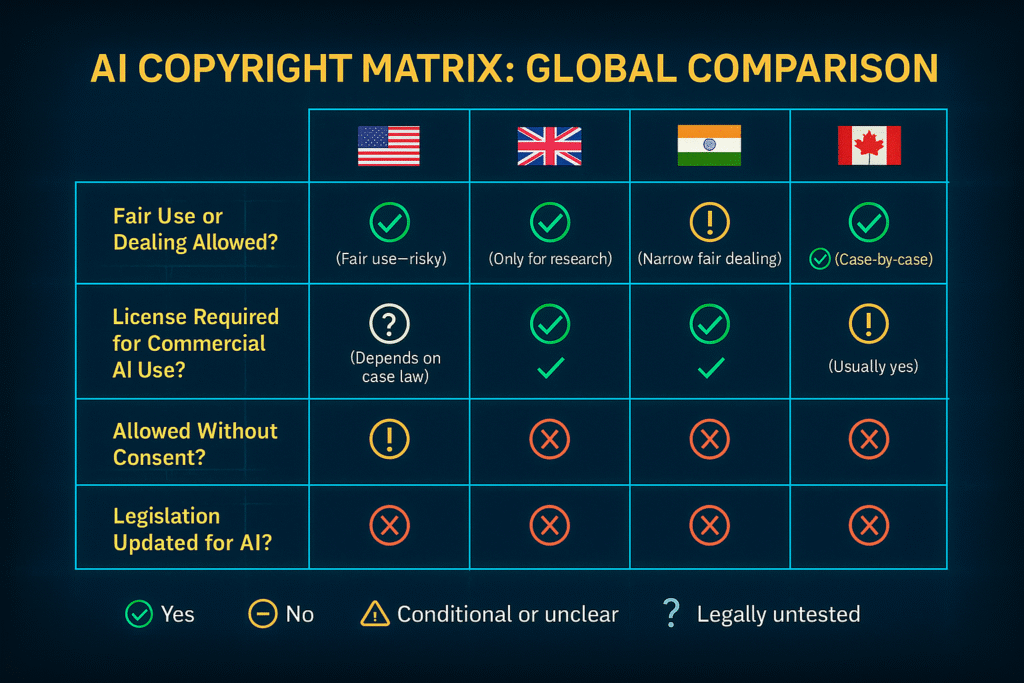
Explore our previous blog: Can You Own What AI Creates?
Flowchart: What AI Inputs Are Legally Safe?
Here’s a simplified guide to help tech firms understand what’s allowed globally:
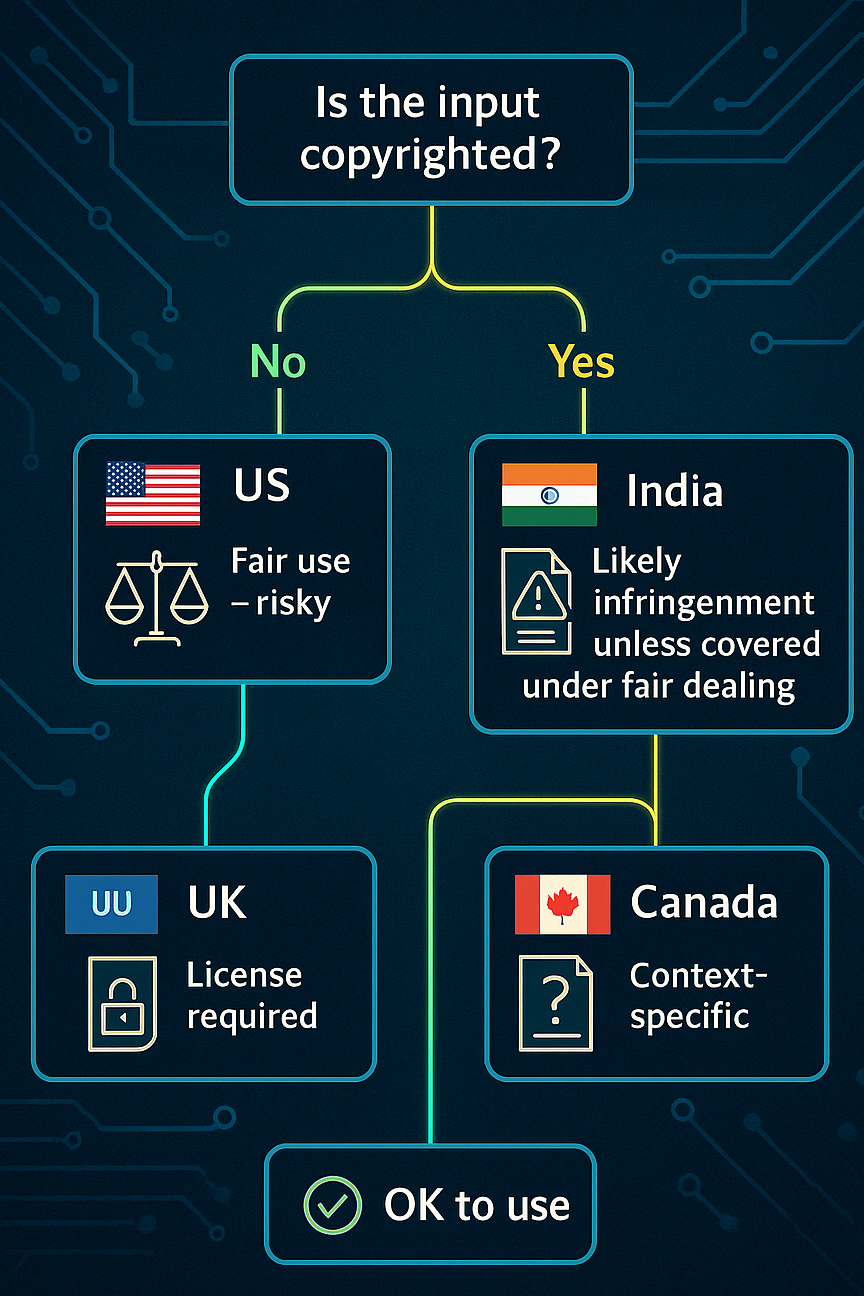
Sample Clause for AI Licensing Agreements
Law firms and AI startups should now consider adding explicit copyright clauses in contracts with data providers. Here’s a sample:
AI Usage Clause:
“The Licensee shall not use the Licensed Content for training or developing machine learning models or artificial intelligence systems without the express written consent of the Licensor, which may be subject to additional fees or terms.”
View our customizable AI Licensing Template
Landmark Cases to Watch
Case Name Jurisdiction Relevance Authors Guild v. Google (2015) US Set precedent on fair use and digital books Getty Images v. Stability AI (UK, 2023) UK Challenged image scraping for AI New York Times v. OpenAI (2023) US Copyright claims on scraped journalism Zarya v. ChatNova Inc. (Canada, 2024) Canada Ongoing case on AI-generated summaries
AI Copyright: Legal Opinions & Regulatory Trends
Experts worldwide are calling for clearer AI copyright rules. In its 2024 report, the World Intellectual Property Organization (WIPO) urged countries to:
- Define “training” as a separate right under copyright law
- Create global licensing markets for data inputs
- Ensure moral rights aren’t diluted by AI mass usage
WIPO Report on AI and Copyright
What This Means for Creators and Developers
| For Authors | For Tech Firms |
|---|---|
| Register your copyrights | Avoid training on unlicensed data |
| Use digital watermarks | Negotiate collective licensing deals |
| Join copyright coalitions | Add indemnity clauses in vendor contracts |
| Monitor AI outputs with detection tools | Stay updated on jurisdictional laws |
Final Takeaway: AI Copyright is a Legal Frontier, Not a Grey Zone
The AI copyright lawsuit filed against Microsoft and OpenAI is not just a legal skirmish, it’s a seismic shift in how we define ownership in the digital age. Across the globe, courts are rebalancing creator rights and machine learning innovation.
For authors, this is a call to legally protect and enforce their work. For developers, it’s time to build transparent, rights-respecting AI systems before the law catches up, because it’s happening faster than ever.
Need Help Navigating AI Copyright Licensing or Compliance?
LexNova Consulting can help you structure licensing agreements, ensure AI compliance, and defend or enforce IP rights across jurisdictions.
Contact Us for a consultation.
FAQs on AI Copyright
Can I use public web data to train AI without permission?
Only if it’s not copyrighted or falls under fair use/fair dealing, which varies by country.
Does AI-generated content qualify for copyright?
In most countries, no. Copyright is granted only to works with identifiable human authorship.
What’s the penalty for copyright-infringing AI training?
It may include injunctions, statutory damages, market bans, or forced licensing.
Are licensing marketplaces available for AI training datasets?
Some are emerging, such as LAION and Open Data Commons, but they are not globally uniform or legally vetted.
Disclaimer
This blog is intended for informational purposes only and does not constitute legal advice. The content reflects developments as of June 2025 aand may not reflect any changes in law or regulation after June 2025. Readers should consult qualified legal professionals before making decisions based on this content. LexNova Consulting is not responsible for any actions taken or not taken based on the information provided herein.
